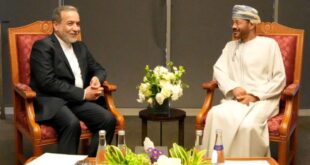 TEHRAN (Fars News Agency) Iraqi President Jalal Talabani took back his earlier statement that he does not recognize the 1975 Algiers border accord with Iran, saying on Iranian state television Friday that the treaty remains valid.
TEHRAN (Fars News Agency) Iraqi President Jalal Talabani took back his earlier statement that he does not recognize the 1975 Algiers border accord with Iran, saying on Iranian state television Friday that the treaty remains valid.
“In my view, this agreement is not nullified,” Talabani said in Persian, the language spoken in Iran. “I’m calling for a long-term strategic agreement between Iran and Iraq.”
Talabani made the comments in an interview with the Iranian television Friday after a meeting with Iranian ambassador to Baghdad Hassan Kazemi Qomi.
Talabani’s office also in a statement released on Thursday said that the Algiers Accord was “valid” but Iraq had some “reservations” about it and wanted mutual talks with Iran for an agreement.
The fresh statements by Talabani are in sharp contrast with his earlier remarks saying he didn’t recognize the Algiers Accord because it was signed between the former Shah of Iran and Iraq’s former dictator Saddam Hussein and not between Iran and Iraq.
Talabani’s comments provoked widespread criticism from Iran, with Iran’s Foreign Ministry saying the accord was “irrevocable” and that factors such as war and change of governments can’t harm its credibility.
The Algiers Accord, which Iran and Iraq signed in 1975, set the border between the two countries in the middle of the waterway that empties into the Persian Gulf, known as Arvand Rood in Iran and Shatt-al-Arab in Iraq.
Former Iraqi dictator Saddam Hussein tore up a copy of the treaty in a televised broadcast five days before his troops invaded Iran in September 1980, starting a bloody eight-year war that ended in a UN-brokered cease-fire in 1988. The two countries have yet to sign a formal peace treaty.
Talabani has generally enjoyed cordial relations with Tehran during his years as a guerrilla leader of the Patriotic Union of Kurdistan fighting Saddam and then after he took office as Iraqi president.
 Eurasia Press & News
Eurasia Press & News



